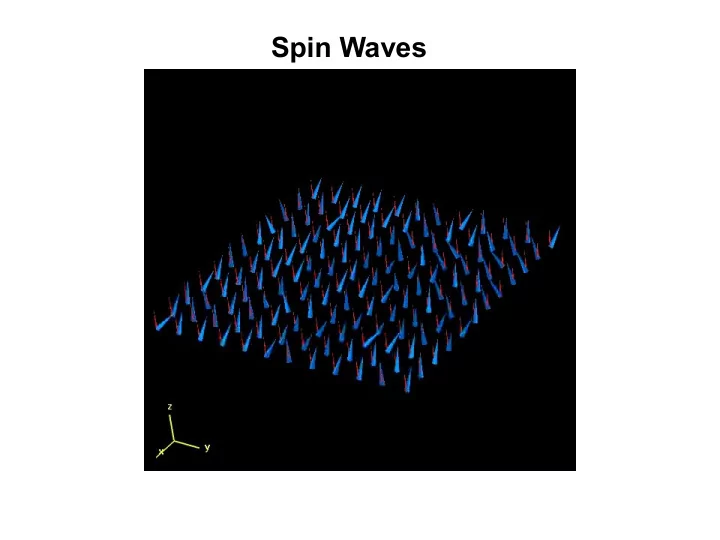

Spin Waves
Spin Waves
Spin Waves
Inelastic electron scattering – SPEELS 2 ML Fe/W(110) @ RT -Q || = K || = k || i sin( θ ) f sin( θ 0 - θ ) - k || 6000 I Intensity [counts/s] I h = E i - E f 3000 k i [110] θ 0 k f 0 3000 Difference [counts/s] Diff θ h 2000 E = 4 eV M [001] Q E = 20 meV _ 1000 K = 0.6 Å -1 [110] Fe 0 0 100 200 Energy Loss [meV] W(110) Difference I = I - I
The SPEEL – Spectrometer Analyzer Channeltron 90 ° -Monochromator circularly polarized Sample preparation Photocathode- light GaAs- preparation - LEED photocathode - MOKE Polarization - Auger P = 0.75 ± 0.1 180 ° -Monochromator SPEEL- H. Ibach, D. Bruchmann, R. Vollmer, spectrometer M. Etzkorn, P. S. Anil Kumar and J. Kirschner, Rev. Sci. Instrum., 74 (2003) 4089.
SPEELS – fundamental example 8 ML Co on Cu(001) X K K X X X spin wave excitation 0.10 I Spin wave energy (meV) 400 Normalized intensity 300 0.05 200 I Stoner-continuum 100 SPEELS data neutron data 0 0.00 -2 -1 0 1 2 0 100 200 300 400 500 Energy loss (meV) -1 Wave vector (Å ) E = 6.7 eV E = 40 meV R. Vollmer (†), M. Etzkorn, P. S. Anil Kumar, H. Ibach, J. Kirschner, Phys. Rev. Lett. 91 , 147201 (2003). K = 0.87 Å -1 neutron data: R. N. Sinclair and B. N. Brockhouse, Phys. Rev. 120 , 1638 (1960).
Spin wave dispersion for the 2 ML Fe/W(110) film _ _ _ H H 300 D bulk = 280 meVÅ 2 Spin wave energy (meV) 250 NNH model for 2 ML Fe 200 h = 12 JS [1 - cos(Q a 0 /2)] 150 100 h = DQ 2 (1 - Q 2 ) 50 D = 180 meVÅ 2 ß = 0.256 0 Difference (103c/s) FWHM (meV) 100 20 E = 4 eV 75 15 E = 20 meV 50 10 25 5 For Q > 1.1 Å -1 0 0 E = 6.25 eV -1.8 -1.5 -1.2 -0.9 -0.6 -0.3 0.0 0.3 0.6 0.9 1.2 1.5 1.8 E = 25 meV -1 ) Wave vector(A W. X. Tang, Y. Zhang, I. Tudosa, J. Prokop, M. Etzkorn, J. Kirschner, Phys. Rev. Lett. 99 , 087202 (2007).
Brillouin light scattering (BLS) process = inelastic scattering of photons from spin waves q q q SC L sc = L spectrum of scattered light BLS-Intensity [Counts] Stokes anti-Stokes proportional to the spin wave intensity 2 Frequensy shift [GHz] Spin wave frequency
Brillouin light scattering spectrometer high-resolution interferometry with high contrast for measurements of acoustic phonons and spin waves Courtesy of J. Hamrle, TU Kaiserslautern
Space and time resolved BLS spatial resolution: 30 µm (300nm) time resolution: 1.7 ns dynamic range: >60 dB O. Büttner et al., PRB 61 , 11576 (2000)
Brillouin light scattering spectrometer Tandem Fabry-Perot Interferometer Sketches of mechanical stage and mirror mount for the FP1 rigid mirror are reproduced from John Sandercock’s 1993 manual.
Spin waves in a magnetic film
Heusler compound Co 2 Cr 1-x Fe x Al: Magnetic properties determined by BLS Brillouin light scattering spectrum Mesurement of perpendicular magnetization gradient 3500 3500 26 24 3000 3000 CCFA/Cr CCFA/Cr 22 80 Oe 80 Oe BLS frequency [GHz] 20 2500 2500 H || [110] H || [110] BLS intensity [a.u.] BLS intensity [a.u.] 18 2000 2000 16 14 1500 1500 12 10 1000 1000 8 500 500 6 4 0 0 -30 -30 -20 -20 -10 -10 0 0 10 10 20 20 30 30 0.0 0.2 0.4 0.6 0.8 1.0 1.2 1.4 1.6 1.8 2.0 frequency [GHz] frequency [GHz] H [kOe] by fit to model found: A =0.48 0.4 erg/cm 3 (for bcc Fe: A =2.0 erg/cm 3 ) Courtesy of J. Hamrle, TU Kaiserslautern
Heusler compound Co 2 MnSi: anisotropy and structural transition Al(1.3nm)/Co 2 MnSi(30nm)/Cr(40nm)/MgO(100): 16.0 experimental data z] numerical fit frequency [GH 15.6 1,0 15.2 3 ] K 1 = – 9 10 4 erg/cm 3 5 erg/cm 0,8 14.8 0,6 1 [10 0,4 S 14.4 B2 L2 1 L B -K 0,2 0 45 90 135 180 225 270 315 360 sample orientation [deg] 0,0 350 375 400 425 450 475 500 annealing temperature [°C] volume anisotropy constant K drops down by a factor of 10 Courtesy of J. Hamrle, TU Kaiserslautern
Recommend
More recommend